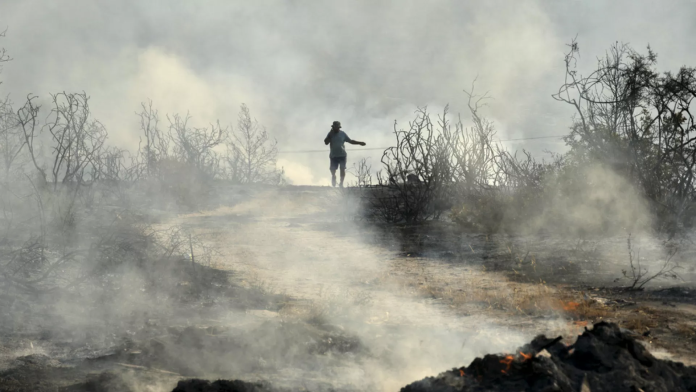Wildfires fuelled by extreme temperatures and fierce winds have ravaged landscapes across Turkey and Cyprus, claiming lives and displacing communities during an unprecedented Mediterranean heatwave, according to Reuters.
In central Turkey’s Eskisehir province, ten firefighters perished while battling a rapidly advancing blaze on Wednesday, with fourteen others injured. The inferno later spread to neighbouring Afyonkarahisar province, forcing mass evacuations as flames encroached on villages and towns.
North of Limassol, Cyprus witnessed what residents described as “sheer hell” when a wildfire engulfed mountain villages overnight. Two civilians were found dead in their car after becoming trapped by the flames, while scores of homes were reduced to ashes.
Cypriot authorities declared the situation “unprecedented,” deploying aircraft from Spain, Egypt, Jordan, Israel, and British military bases alongside EU firefighting teams.
Ersin Tatar, President of the Turkish Republic of Northern Cyprus, extended humanitarian assistance to the Republic of Cyprus, stating:
In the spirit of humanitarian responsibility, we have expressed our readiness to support the firefighting efforts against this serious threat to both human life and the environment.
This offer emerged despite ongoing political tensions, underscoring the transnational urgency of the disaster.
The Mediterranean basin, identified as a global climate change hotspot, is warming 20% faster than the planetary average. Scientists from the Euro-Mediterranean Center on Climate Change (CMCC) confirm sea surface temperatures reached alarming anomalies of +5°C this June compared to the 1985-1999 baseline, a trend accelerating since the 1980s at 0.4°C per decade.
Research by Carbon Brief reveals that 95% of European heatwaves now bear the fingerprint of anthropogenic climate change, with June events occurring ten times more frequently than in pre-industrial times.
While Cyprus investigates possible arson as the fire’s cause, the disaster has momentarily bridged political divides. President Tatar’s offer of cross-border aid through UN channels reflects growing recognition that climate impacts transcend sovereignty disputes. This aligns with earlier confidence-building measures discussed at UN-mediated talks, including environmental cooperation and mine clearance in buffer zones.
